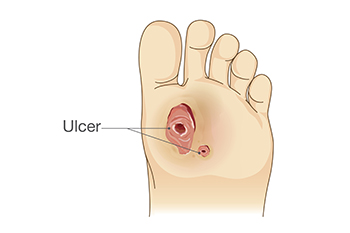Connect With Us
Blog

Neuropathy, a condition often associated with diabetes but not exclusive to it, refers to nerve damage that can result in loss of sensation in the feet. Non-diabetic foot wounds stemming from neuropathy occur due to the inability to perceive pain or pressure, leading to unnoticed injuries that can worsen into ulcers. Without proper sensation, individuals may continue walking on injured feet, exacerbating the wounds. Podiatrists play an important role in managing these ulcers by conducting thorough assessments to determine the extent of damage, implementing preventive measures to alleviate pressure on affected areas, and initiating treatment plans tailored to individual needs. This may involve wound care, infection management, offloading techniques to reduce pressure on the wound site, and patient education on foot care practices to prevent further complications. If you have a foot wound of any type, it is suggested that you schedule an appointment with a podiatrist for immediate treatment.
Wound care is an important part in dealing with diabetes. If you have diabetes and a foot wound or would like more information about wound care for diabetics, consult with David A. Edmonds, DPM from Advanced Podiatry Associates. Our doctor will assess your condition and provide you with quality foot and ankle treatment.
What Is Wound Care?
Wound care is the practice of taking proper care of a wound. This can range from the smallest to the largest of wounds. While everyone can benefit from proper wound care, it is much more important for diabetics. Diabetics often suffer from poor blood circulation which causes wounds to heal much slower than they would in a non-diabetic.
What Is the Importance of Wound Care?
While it may not seem apparent with small ulcers on the foot, for diabetics, any size ulcer can become infected. Diabetics often also suffer from neuropathy, or nerve loss. This means they might not even feel when they have an ulcer on their foot. If the wound becomes severely infected, amputation may be necessary. Therefore, it is of the upmost importance to properly care for any and all foot wounds.
How to Care for Wounds
The best way to care for foot wounds is to prevent them. For diabetics, this means daily inspections of the feet for any signs of abnormalities or ulcers. It is also recommended to see a podiatrist several times a year for a foot inspection. If you do have an ulcer, run the wound under water to clear dirt from the wound; then apply antibiotic ointment to the wound and cover with a bandage. Bandages should be changed daily and keeping pressure off the wound is smart. It is advised to see a podiatrist, who can keep an eye on it.
If you have any questions, please feel free to contact our offices located in Northampton and Allentown, PA . We offer the newest diagnostic and treatment technologies for all your foot care needs.

Bunions are bony protrusions that form at the base of the big toe, causing it to lean inward toward the other toes. Bunions often result from a combination of genetic factors, wearing improper footwear, and structural issues in the foot. As the bunion develops, it can lead to pain, inflammation, and difficulty with shoe wear. In severe cases, complications such as bursitis, hammertoes, or even arthritis may arise due to the altered foot mechanics. If you have a bunion that is causing significant discomfort and interfering with your daily activities, it is suggested that you schedule an appointment with a podiatrist who can offer you various treatment options.
If you are suffering from bunion pain, contact David A. Edmonds, DPM of Advanced Podiatry Associates. Our doctor can provide the care you need to keep you pain-free and on your feet.
What Is a Bunion?
Bunions are painful bony bumps that usually develop on the inside of the foot at the joint of the big toe. As the deformity increases over time, it may become painful to walk and wear shoes. Women are more likely to exacerbate existing bunions since they often wear tight, narrow shoes that shift their toes together. Bunion pain can be relieved by wearing wider shoes with enough room for the toes.
Causes
- Genetics – some people inherit feet that are more prone to bunion development
- Inflammatory Conditions - rheumatoid arthritis and polio may cause bunion development
Symptoms
- Redness and inflammation
- Pain and tenderness
- Callus or corns on the bump
- Restricted motion in the big toe
In order to diagnose your bunion, your podiatrist may ask about your medical history, symptoms, and general health. Your doctor might also order an x-ray to take a closer look at your feet. Nonsurgical treatment options include orthotics, padding, icing, changes in footwear, and medication. If nonsurgical treatments don’t alleviate your bunion pain, surgery may be necessary.
If you have any questions, please feel free to contact our offices located in Northampton and Allentown, PA . We offer the newest diagnostic and treatment technologies for all your foot care needs.

A broken ankle, or ankle fracture, occurs when one or more of the bones making up the ankle joint break. This injury often happens due to trauma, such as twisting the ankle during a fall, sports injury, or car accident. Symptoms of a broken ankle include severe pain, swelling, bruising, inability to bear weight, and deformity of the ankle joint. Early intervention by a podiatrist is essential to properly diagnose and treat the fracture. Treatment typically involves immobilization of the ankle with a cast or brace to allow the bones to heal properly. In some cases, surgery may be necessary to realign the bones or stabilize the fracture with hardware. While recovery time varies depending on the severity of the injury, rehabilitation is often recommended to restore strength, flexibility, and function to the ankle joint. If you have sustained an ankle fracture, it is strongly suggested that you schedule an appointment with a podiatrist for proper treatment and rehabilitation, for the best possible outcome with minimal complications.
Broken ankles need immediate treatment. If you are seeking treatment, contact David A. Edmonds, DPM from Advanced Podiatry Associates. Our doctor can provide the care you need to keep you pain-free and on your feet.
Broken Ankles
A broken ankle is experienced when a person fractures their tibia or fibula in the lower leg and ankle area. Both of these bones are attached at the bottom of the leg and combine to form what we know to be our ankle.
When a physician is referring to a break of the ankle, he or she is usually referring to a break in the area where the tibia and fibula are joined to create our ankle joint. Ankles are more prone to fractures because the ankle is an area that suffers a lot of pressure and stress. There are some obvious signs when a person experiences a fractured ankle, and the following symptoms may be present.
Symptoms of a Fractured Ankle
- Excessive pain when the area is touched or when any pressure is placed on the ankle
- Swelling around the area
- Bruising of the area
- Area appears to be deformed
If you suspect an ankle fracture, it is recommended to seek treatment as soon as possible. The sooner you have your podiatrist diagnose the fracture, the quicker you’ll be on the way towards recovery.
If you have any questions, please feel free to contact our offices located in Northampton and Allentown, PA . We offer the newest diagnostic and treatment technologies for all your foot care needs.

